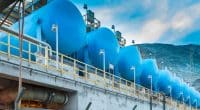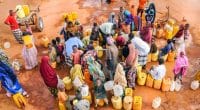In 2021, more than 4.6 million people had access to improved water services thanks to projects financed by French Development Agency(AFD) to the tune of €1 billion. This is just one example of the significant contribution made by development partners to the implementation of water supply policies, particularly in Africa. On the occasion of the 10th World Water Forum, which opened in Bali on 18 May, Afrik 21 takes a closer look at those who finance water according to specific criteria, and how they are adapting their approach to the times.
Is access to water without financing possible? The question no longer arises today, as the entire global community has finally understood the need for financing the operation, production, treatment and distribution of water. This realisation is reflected in the increase in national budgets allocated to the water sector, up by 5.8% in Togo in 2024, taking the budget to €27.5 million this year compared with €26 million in 2023. Among development partners, there are also movements in the annual portfolios in favour of the water sector.
In 2021 and 2022, for example, the French Development Agency (AFD) will be supporting water projects around the world to the tune of €1 billion and €1.2 billion respectively. Of the €1.2 billion granted (in the form of loans or grants) in 2022, €610 million has been earmarked for Africa, where the rate of access to drinking water remains very low. The United Nations Children’s Fund (UNICEF) reports that 418 million people out of 1.3 billion still do not have access to drinking water.
In response to this crisis, AFD provides “different types of loans (to States, businesses and local authorities). Their conditions are determined according to the nature of the project and its environment (political, economic, social and environmental impact and context) and the quality of the borrower (sector of activity, rating, guarantees), as well as whether these loans are concessional or non-concessional”, says the agency headed by Rémy Rioux. The financial institution also uses grants to finance projects in support of the sixth Sustainable Development Goal (SDG6), which aims to provide access to drinking water for all by 2030.
Read Also – Loïc Fauchon: « Peace and prosperity cannot be achieved by ignoring water »
Like AFD, several other development partners contribute to the dynamism of the water sector in Africa. This is the case of the African Development Bank (AfDB), which inaugurated its first office in Central Africa in April 2024 in Cameroon, from where it will monitor all the projects it finances in the country of the Indomitable Lions, Equatorial Guinea, the Central African Republic (CAR), Congo, the Democratic Republic of Congo (DRC), Gabon and Chad.
What is the aim of the BOAD’s new sector strategy?
The European Investment Bank (EIB), the World Bank, the European Bank for Reconstruction and Development (EBRD), the Saudi Fund for Development (SFD), the Arab Bank for Economic Development in Africa (BADEA), the Islamic Development Bank (IsDB) and the Export-Import Bank of Hungary (Exim Hungary), Exim Bank of India, Exim Bank of China, the Opec Fund for International Development (OFID), the Abu Dhabi Fund for Development (AFDF), the Canada-African Development Bank Climate Fund (CACF), the Global Environment Facility (GEF), and the West African Development Bank (BOAD), which has set up a new 2024-2028 sector strategy in the area of sanitation, as sanitation cannot be achieved without clean water. This strategy is based on four pillars: improving universal, sustainable and affordable access to drinking water; improving access to sanitation services for all populations, taking account of regional disparities; improving knowledge, monitoring and optimisation of resources; and strengthening governance of the sector.
The joint development finance institution of the States of the West African Monetary Union (WAMU) essentially grants loans. To obtain financing, the State must submit a request for financing signed by the authorised authority, in this case the Minister of the Economy and Finance. This request must be accompanied by detailed technical studies, economic and financial studies and environmental and social impact studies. In the case of advances of funds for studies (seed money), the request is submitted by the authorised authority (e.g. the ministry in charge of finance), together with the project description, terms of reference and estimated budget for the study.
“Advance funding for studies is intended for governments and has not yet been extended to the private sector. The maximum amount allocated to an operation is 30 billion CFA francs (nearly 180 million euros), unless otherwise authorised by the bank’s senior management. As regards advances of funds for operational studies, the amount allocated may be up to one billion CFA francs (just under €6 million)”, says the BOAD.
Emphasis on start-up and SME projects
In addition to banks, government agencies, organisations and associations also finance water projects. These include the German Development Agency (KfW), the German Agency for International Development Cooperation (GIZ), the United States Agency for International Development (USAID), the Japan International Cooperation Agency (JICA) and the Korea International Cooperation Agency (KOICA). There are also organisations such as the King Salman Humanitarian Aid and Relief Centre (KSrelief), the United Nations (UN), the United Nations Children’s Fund (UNICEF), etc.
Although the state is the guarantor of a nation’s water security, it is not alone in being able to work towards achieving MDG6. Small and medium-sized enterprises (SMEs) and start-ups are also powerful tools for development. But “access to finance remains a major problem for start-ups, especially African ones. They are often created in response to local needs that have little or no coverage, yet they generate jobs, create value and have a wide range of impacts”, points out AFD, which has set up the Proparco subsidiary dedicated to the private sector.
For 45 years, this AFD subsidiary has been promoting sustainable development in economic, social and environmental terms, through pre-seed and seed investments in start-ups via digital Africa, direct investments from pre-series A to series D for amounts of between €0,5 and €5 million, bridge financing between two rounds of financing through the Bridge Fund by Digital Africa, and indirect investments via seed and venture capital funds, in which Proparco can invest between €5 and €15 million.
Significant funding, but still insufficient in 2024
“While traditional financing mechanisms benefit more stable companies, it is innovative financing that can adapt to the conditions and needs of agile start-ups”, explained Hamed Beheshti, co-founder of start-up Boreal Light, in an interview with Afrik 21 in July 2023. The German supplier of water treatment solutions is one of a number of start-ups supporting government policies with its containerised solar-powered desalination solutions.
At the 78th General Assembly of the United Nations (UN) in September 2023, the international community pledged to mobilise 30 billion dollars a year by 2030 for water, compared with 10 and 19 billion dollars a year at present. The funds will be raised as part of the “Mind the Gap – Invest in Water” campaign launched by the African Union Commission (AUC). Achieving this funding target will accelerate sustainable development, according to Amina J. Mohammed, UN Deputy Secretary-General and Chair of the UN Panel on Sustainable Development.
As the 10th World Water Forum continues in Bali, Indonesia, stakeholders in the water sector are also hoping for strong financial commitments, particularly from development partners, to ensure that no-one is left behind and that there is equality and non-discrimination in the provision of water services.
Inès Magoum







